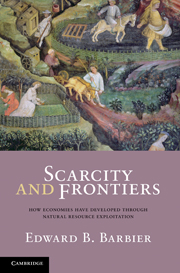Book contents
- Frontmatter
- Contents
- Figures
- Tables
- Boxes
- Preface
- Acknowledgements
- 1 Introduction: scarcity and frontiers
- 2 The Agricultural Transition (from 10,000 BC to 3000 BC)
- 3 The Rise of Cities (from 3000 BC to 1000 AD)
- 4 The Emergence of the World Economy (from 1000 to 1500)
- 5 Global Frontiers and the Rise of Western Europe (from 1500 to 1914)
- 6 The Atlantic Economy Triangular Trade (from 1500 to 1860)
- 7 The Golden Age of Resource-Based Development (from 1870 to 1914)
- 8 The Age of Dislocation (from 1914 to 1950)
- 9 The Contemporary Era (from 1950 to the present)
- 10 Epilogue: the Age of Ecological Scarcity?
- Index
- References
1 - Introduction: scarcity and frontiers
Published online by Cambridge University Press: 05 June 2012
- Frontmatter
- Contents
- Figures
- Tables
- Boxes
- Preface
- Acknowledgements
- 1 Introduction: scarcity and frontiers
- 2 The Agricultural Transition (from 10,000 BC to 3000 BC)
- 3 The Rise of Cities (from 3000 BC to 1000 AD)
- 4 The Emergence of the World Economy (from 1000 to 1500)
- 5 Global Frontiers and the Rise of Western Europe (from 1500 to 1914)
- 6 The Atlantic Economy Triangular Trade (from 1500 to 1860)
- 7 The Golden Age of Resource-Based Development (from 1870 to 1914)
- 8 The Age of Dislocation (from 1914 to 1950)
- 9 The Contemporary Era (from 1950 to the present)
- 10 Epilogue: the Age of Ecological Scarcity?
- Index
- References
Summary
Resource development is a neglected topic in economic history. To be sure, no economist would be surprised to learn that resource abundance is a function of extraction and transportation cost as well as of physical availability, and the role of substitution in mitigating resource scarcity is widely appreciated … But natural resources still are viewed as the last of the exogenous factors, governed by the principle of diminishing returns in an economic growth process whose other constituents have come to be treated both as endogenous and subject to increasing returns.
(David and Wright 1997, p. 204)Introduction
For an early Spring day in Washington, DC in 1913, the weather was overcast but mild. The large crowd milling about the Capitol were jubilant and expectant. After all, their presidential candidate, Woodrow Wilson, had swept to victory the previous November, ousting the incumbent William Taft and soundly beating the third party candidate Theodore Roosevelt.
To the average American, Woodrow Wilson embodied the spirit and success of his times. His life and career spanned the US Civil War of the 1860s, the hard post-war years of reconstruction and reconciliation, and, from 1870 onwards, the rapid expansion of the US economy across the North American continent. Woodrow Wilson also typified the American Dream. The son of a southern Presbyterian minister, Wilson grew up in the South but eventually became a professor at Princeton University and then its President. He entered politics and was Governor of New Jersey from 1911 to 1913. He ran for President for the first time and won. Just like the United States itself, there seemed to be no limits to what this mild-mannered, devout and hard-working American could accomplish.
- Type
- Chapter
- Information
- Scarcity and FrontiersHow Economies Have Developed Through Natural Resource Exploitation, pp. 1 - 46Publisher: Cambridge University PressPrint publication year: 2010



